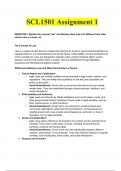Exam (elaborations)
SCL1501 Assignment 1 (COMPLETE ANSWERS) Semester 1 2024
- Course
- Institution
- Book
QUESTION 1 Explain the concept ‘law” and thereby show how it is different from other social rules or norms. (4) QUESTION 2 2.1 “State” is a non-physical entity, an abstract notion or phenomenon created by citizens through their deemed agreement (i.e. social contract). (a) In the light of th...
[Show more]










